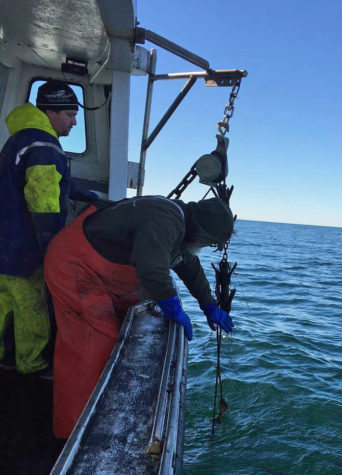
COURTESY OF THE CENTER FOR COASTAL STUDIES: Capt. Mike Rego and Bob Mallory grapple for gear aboard the F/V Lilly off Long Point, Provincetown.
PROVINCETOWN – A project to recover derelict fishing gear from Cape Cod Bay wrapped up Monday.
Crews from the Center for Coastal Studies recovered about 200 lobster traps from the Bay between Sandwich and Provincetown during the federally funded effort.
“About half of them were returned to the owners – identifiable and to the owner and therefore returnable,” said Laura Ludwig, the program coordinator.
About 30 of the traps were not identifiable and will be auctioned off by the Division of Marine Fisheries.
The remaining traps recovered were in poor condition and will be scrapped for metal.
Ludwig said traps can be expensive and every little bit of savings can help fishermen.
“Any single lobster traps can cost between $50 and $150 dollars, and that is brand new,” Ludwig said. “So the amount of return was certainly appreciated by those who received their gear back – for sure.”
According to Ludwig, two or three lobster traps that were recovered in excellent condition had last been fished in 1999.
“You can just imaging traps that were 18 years old were in perfect condition, they were returnable to the owners and would still be able to be fished today,” she said. “That’s a testament to the resiliency of fishing gear right there.”
Other interesting finds included a ten-speed bicycle frame and a charcoal grill.
Previous efforts to clean the bay of debris recovered 660 lobster traps and a total of 16 tons of gear.
This year’s project also had a scientific purpose and researchers will take a long look at data collected.
“We got significant amount of data from three different facets: From the sonar surveys, from the diver reconnaissance and from the recovery itself,” Ludwig said.
The sonar surveys will be studied to see if they indicate if lost gear is entrenched and part of the habitat versus gear that is more detrimental to the habitat.
“We’re really trying to do a little more research about the impacts of the gear on the habitat and on the living creatures,” Ludwig said. “In addition to cleaning up the bottom of the ocean, we are trying to make that type of effort more efficient in the future.”
Because the project was federally funded, Ludwig is unsure when crews will be able to get back out on the water for future cleanup efforts.
“All of this is very subject to funding. It’s a pretty labor intensive and cost intensive project in so far as the sonar equipment and the recovery aspect,” she said. “When we can get the funding we will definitely pursue this type of thing again, but there is no guarantee, particularly in this environment.”
Areas off of Chatham were planned for part of the project, but weather conditions and other challenges did not make that possible.
By BRIAN MERCHANT, CapeCod.com NewsCenter























